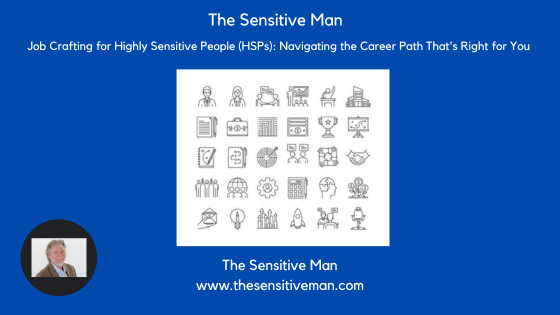|
A Blog about Sensory Processing Sensitivity from the Worldview of a High-Sensing Male
Total words 655, Time to read: 2 minutes 45 seconds If you identify as a Highly Sensitive Person (HSP), you are likely well aware of how your unique sensory sensitivity can influence your interactions and experiences in the workplace. Understanding and embracing your sensitivity can lead to surviving and thriving in your career by following a process known as job crafting. This personalized approach allows you to explore and find work environments that respect and harness your natural traits like empathy, intuition, and keen attention to detail. In this blog post, we'll guide you through understanding yourself as an HSP, identifying careers that might be a good fit, and navigating the job search process. Understanding Yourself as an HSP Introduction to Job Crafting: Job crafting is a technique that allows individuals to reshape their jobs to fit their skills and passions better, as well as, in the case of HSPs, their sensitivity. This could mean adjusting your tasks, rethinking your interactions, or changing your work environment to better suit your emotional and sensory needs. Personality Tests and Exercises: To start, HSPs should engage in self-reflection exercises and consider taking personality assessments like the Myers-Briggs Type Indicator (MBTI) or the Highly Sensitive Person Scale. These tools can provide deeper insights into how you perceive the world and process stimuli, which is crucial for understanding what kinds of work environments will suit you best. Value Systems Exercises: It's also important to clarify your values and what you need to feel fulfilled at work. Exercises like listing your top five values or visualizing your ideal workday can help articulate what truly matters to you. This clarity will guide you in seeking environments that resonate with your personal and professional goals. Identifying Suitable Careers Sensitive individuals often excel in roles that make use of their inherent abilities. For example, careers in the arts, counseling, academia, and healthcare can be highly rewarding for HSPs. These fields often require a depth of thought, sensitivity to others' needs, and a detailed-oriented approach—traits that HSPs naturally possess. However, it's not just about the field you choose; it's about finding a role that aligns with your sensitivity. For instance, within healthcare, an HSP might thrive more in roles that require one-on-one interactions rather than high-stress emergencies. The Job Search Process Navigating the job market as an HSP requires a strategy that acknowledges your sensitivity as a strength. Here are some tips: Unconventional Job Searching: Beyond the usual job boards, HSPs should consider tapping into professional networks through platforms like LinkedIn or joining specific forums and groups that cater to sensitive individuals or the industries in which they are interested. Sometimes, the best opportunities come from connections made in unexpected places. Resume Writing: Your resume should highlight your HSP traits as strengths. For example, emphasize your exceptional empathy, ability to manage and resolve conflicts, or detail-oriented project management skills. Each of these can be highly desirable in many professions. Selling Your Traits in the Job Market: In interviews, be prepared to discuss examples of how your sensitivity has been an asset in your work. You might talk about a time when your attention to detail caught a potentially costly mistake or how your empathy helped resolve a client's issue effectively. Resources for HSPs: Several resources can aid your job search. Websites like The Highly Sensitive Person (hsperson.com) and Psychology Today often post articles and job opportunities suited for HSPs. Additionally, consider consulting with a career counselor specializing in helping sensitive individuals. Here's an additional link from friend and HSP Coach, Lauren Hunter: https://hspjourney.com/25-good-jobs-for-the-highly-sensitive-person/ Conclusion Crafting a job that fits your high sensitivity is not just about finding the right type of work; it's about ensuring your work environment values and supports your innate traits. By understanding yourself, identifying suitable careers, and applying targeted job search strategies, you can find a job that fits and craft a career that fulfills you. Remember, as an HSP, you bring unique and valuable perspectives to the table, and the right job is one that will celebrate, not just accommodate your sensitivity.
0 Comments
Leave a Reply. |
AuthorBill Allen currently lives in Bend, Oregon. He is a certified hypnotist and brain training coach at BrainPilots.com. He believes that male sensitivity is not so rare, but it can be confounding for most males living in a culture of masculine insensitivity which teaches boys and men to disconnect from their feelings and emotions. His intent is to use this blog to chronicle his personal journey and share with others. Archives
July 2024
Categories
All
|


 RSS Feed
RSS Feed
